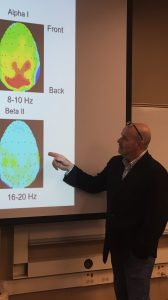
Electrical engineering associate professor Dwight Waddell continues teaching courses while leading UM’s new biomedical engineering degree program. Submitted photo
Years ago, a biomedical engineering degree program in the University of Mississippi School of Engineering was only a dream. But with 51 students accepted into the inaugural class last fall, the dream is now a wonderful reality.
“The word is apparently out,” said Dwight Waddell, BME program director and associate professor of electrical engineering. “Our current BME class has representatives from states across the country. Thirty-seven are new freshmen, and we had a fair number of transfers from other departments on campus after we got started last August.”
The idea and initial work for the new program were initiated by Ramanarayanan “Vish” Viswanathan, chair and professor of electrical engineering, with support from Alex Cheng, engineering dean. Waddell, who was a UM associate professor of health, exercise and recreation management, joined the engineering faculty in 2013 to facilitate program development.
“I was responsible for newly created courses, including Physiology for Biomedical Engineers, Biosignal Analysis, Introduction to Biomedical Engineering and a lab-based course to teach bio-measurement techniques,” said Waddell, who worked with Paul Scovazzo, associate professor of chemical engineering, to launch the emphasis. “Prior to this, I taught courses in biomechanics, electromyography and neuromotor control.”
Waddell said the inaugural class is exceptional.
“In truth, it is a hard curriculum, but the inaugural class was notable in their academic preparation before university,” he said. “The average ACT score and high school GPA of the applicants were quite high, which was very exciting for everyone involved. The students are very proactive. They are hungry.”
Last semester, the charter for UM’s Biomedical Engineering Society student chapter was established.
“It was really two students who did the lion’s share of work getting national approval,” Waddell said. “A big shoutout to BME students Justin Reynolds and Juliana Davis for making it happen and recruiting over 20 inaugural student members. It is an exciting time around here.”
If preliminary fall 2018 enrollment figures are any indication of what’s to be expected, the BME program is just getting started.
“The number of admitted applicants for the upcoming fall term is impressive,” Waddell said. “As of Feb 12, we have already admitted 142 biomedical engineering first-year students. This is a substantial increase in admitted students over the same time last year.”
While Waddell said not all of these students will decide to attend the university, he is confident that the number of incoming students will match and exceed expectations.
“Our number of retained students (admitted versus actual attendees) last year was above 50 percent,” he said. “On our original submission to IHL for approval, we estimated 30 freshmen for the second year, and I am confident we will meet and exceed that number.”
Chairs in both the electrical and chemical engineering departments said Waddell’s leadership has exceeded their expectations.
“Dwight is extremely busy this academic year,” Viswanathan said. “In addition to advising all (biomedical engineering) students, he’s juggling teaching two courses each semester, advising students’ research, conducting a search for two tenure-track faculty positions and serving on several university committees.”
“Dwight has done an outstanding job of moving the BME program forward,” said John O’Haver, chair and professor of chemical engineering. “His passion for the program, for the students, and his ability to work well with the departments that are involved in the program have caused it to progress rapidly and well.”
A former postdoctoral researcher at the Georgia Institute of Technology, Waddell has a master’s and a doctoral degree in biomedical engineering from the University of Texas and a bachelor’s degree in mechanical engineering from Louisiana State University.
The Mississippi Institutions of Higher Learning Board of Trustees approved the biomedical engineering program in 2016. Biomedical engineering prepares students for rapidly growing opportunities in three primary job markets: biomolecular engineering, biomedical systems engineering and bioinformatics.
For more information about UM’s biomedical engineering program, visit https://engineering.olemiss.edu/biomedical/